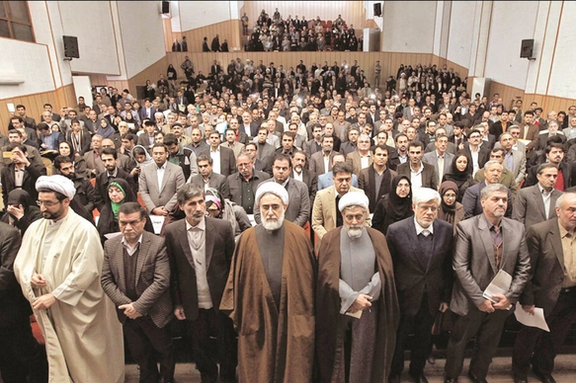Iran’s ‘Reformists’ Await Signal to Field Candidates

Iran's 'reformists' have indicated that they are willing to participate in the snap presidential elections of June 28, provided that the ruling establishment allows them to field their own candidates.
Azar Mansouri, the current head of the Reforms Front and secretary general of the Union of Islamic Iran People’s Party (Etehad-e Mellat-e Iran-e Eslami), indicated in a tweet on Tuesday that reformists are expecting clear signals from the authorities that the elections will be fair, free, competitive, meaningful, and effective. She added that is important to see if the “dominant will”, apparently referring to Supreme Leader Ali Khamenei, wishes “maximal participation” in the upcoming elections.
As Khamenei’s hardliner loyalists have barred others from competing in the last three national elections, voters have turned away from ballot boxes. Turnout has dropped to below 40 percent according to non-official estimates.
Reformists including former President Mohammad Khatami refused to vote in the March 1 elections of the Parliament and Assembly of Experts.
For the first time in his political career, Khatami not only refrained from voting in the parliament and Assembly of Experts elections, despite Supreme Leader Ali Khamenei's repeated declarations that voting is a religious duty, but also defended his decision in solidarity with the majority of Iranians who are angry with the country's governance, in a speech to his advisors on March 6.
In the past few days, however, there have been indications that reformists are seriously considering a return to the ballot boxes if given adequate guarantees that their participation will not serve the ruling establishment and “heat the election oven” to “bake someone else’s bread”.
‘Reformists’ appear determined not to support any candidate outside their own camp in this election, unlike in 2013 and 2017 when they rallied around moderate conservative Hassan Rouhani.
In an editorial in the reformist Etemad newspaper Tuesday, prominent Reformist commentator Abbas Abdi maintained that the populace may be willing to vote again, after shunning the ballot in the past three elections, provided that they are given “a certain level of meaningful choice”.
Ali Shakouri-Rad, the former secretary general of the Etehad-e Mellat Party, has also said that his party has decided to encourage people to participate in the elections provided that a candidate endorsed by the Reforms Front, the umbrella ‘reformist’ coalition, is allowed to run.
Shakouri-Rad who represents his influential party in the Reforms Front said his party has endorsed Mohammad Sadr and Mohammadreza Zafarghandi as potential candidates to the reformists decision-making body.
Sadr, 73, is a nephew of the late Iranian-Lebanese Shia politician Musa al-Sadr and a diplomat. He was appointed as a member of the Expediency Council by Khamenei in 2017 and was reinstated by him in 2022.
Sadr was one of the founding members of the Islamic Iranian Participation Party (IIPF) before 2009 and one of the most vocal critics of President Mahmoud Ahmadinejad’s foreign policy.
Sadr said Tuesday that the leader of the Reforms Front, former President Khatami, suggested to him to run but he has not yet made a decision.
Mohammadreza Zafarghandi, a former secretary-general of the non-profit Iran Medical Council, has been a vocal critic of hardliners and Ebrahim Raisi’s government. Zafarghandi is also one of the veteran members of the Islamic Association of the Iranian Medical Community. The association is part of the Reforms Front.
Since Tuesday, several figures including the ultra-hardliner Mayor of Tehran, Alireza Zakani, former President Akbar Hashemi-Rafsanjani’s son Mohsen Hashemi who is a member of the centrist Servants of Construction (Kargozaran) Party have denied an intention to run.
However, Mehrdad Bazrpash, 45, a hardliner who once served as a member of populist Mahmoud Ahmadinejad’s “young advisers” during his tenure as mayor of Tehran, was named by Meysam Nadi, head of the election headquarters of the Strategic Network of Friends of the Islamic Revolution (Sharyaan), as one of the group’s “principal options”.
Iranian media such as Borna News claim Ali-Akbar Salehi, Iran's foreign minister under Mahmoud Ahmadinejad and nuclear chief under Hassan Rouhani, has also indicated his interest in running for the presidency, although he will be over the maximum age (75) allowed by law to run by two months.